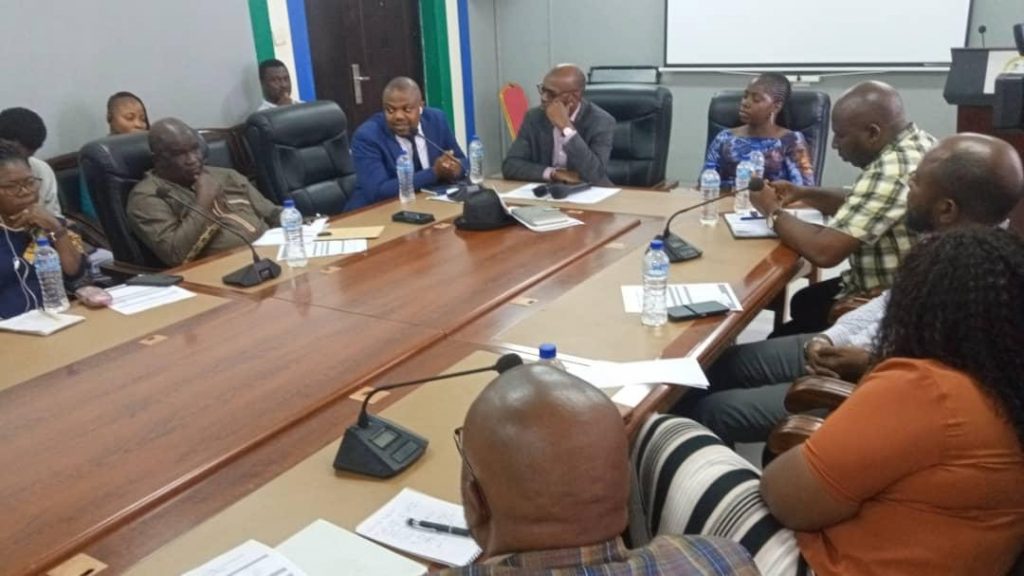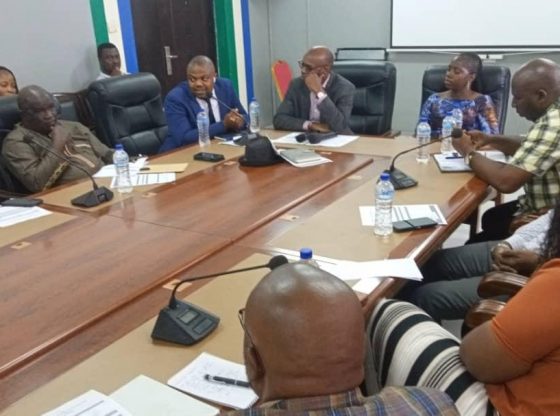The National Council for Civic Education and Development (NaCCED) has the mandate to educate the public on rights, responsibilities and obligations, as well as provide public education on democratic processes including but not limited to elections and electoral processes. Past and recent records have shown that violence and voter apathy mar most elections in Sierra Leone. According to several research documents, this situation is a product of insufficient citizen’s education on elections and electoral processes.

In recognition of the critical role of the Council in addressing this situation, NaCCED is one of the institutions (the others being Campaign for Human Rights and Development International (CHRDI) and Eminent Women (EW)) co-chairing the Civic Education and Conflict Prevention pillar, to support the Electoral Commission of Sierra Leone (ECSL), with the 2023 presidential and parliamentary elections.
In fulfilment of this responsibility, NaCCED organized a Message Development Seminar on Tuesday 10th August, 2022 at the Ministry of Information and Communications Conference Hall. This engagement brought together political party leaders, communication specialists, actors, civil society organizations, musicians etc., to discuss relevant themes on elections, electoral processes, peace and national cohesion.
“We are working in partnership with ECSL and other Election Management Bodies. What we want to do is to provide support for them towards the electioneering process in order to get citizens see voter registration as both a right and a responsibility and to ensure that they abide to the rules and regulations of elections,” said Mr. Kalilu Totangi- NaCCED’s Chairman. In furtherance, “We intend to use this platform today to get guidance from the Electoral Commission for Sierra Leone, Political Parties Registration Commission (PPRC), representatives from the four main political parties, Civil society partners, Independent Commission for Peace, Actors etc., on how to develop critical and enriched information and messages that we could relay to communities and the whole country,” he paused.
Mr. Totangi expressed optimism that the seminar could be a learning platform for all participants on how to utilize the media, political and democratic spaces without being intolerant, which could result to national unrest. Homing in on the purpose of the engagement, “we want to develop messages that could help to inform the people of Sierra Leone about the electioneering process that will commence in September this year. There are critical information that PPRC and ECSL want to send to Sierra Leoneans, they have the content but we have the creativity and the mandate to take that message to the public,” he added.
As part of the strategy to ensure wider dissemination of the messages on the elections and associated processes, Apphive, a text messaging Service Company that will be supporting NaCCED on this national assignment made a presentation on the use of its platform. According to Stephen Owusu, the Business Development Manager for the company, they currently have 1.8 million contacts across all mobile networks in the country. He said their system is programmed to send messages to contacts across networks irrespective of the type of phone, and with or without internet connectivity. Mr. Amanfo disclosed that a voice sms system will soon be added to the service they provide.
Madam Zainab Umu Moseray, the ECSL Commissioner for Western Region thanked NaCCED and other co-chairs for the support to the Commission, recommended key areas to focus on when developing messages for this purpose, especially when dealing with first time voters. “NaCCED needs to communicate and get citizens to understand that it is their responsibility to register, why they should register, the processes involved and why they should come out to vote,” she said. Commissioner Moseray also added that the Council should educate citizens on the “DOs and DON’Ts of the registration process. She said that ECSL will also be working with details forwarded by the National Civil Registration Authority (NCRA) which will be accessed all over the country.
Speaking on behalf of the Campaign for Human Rights and Development International (CHRDI) and also as Co-Chair for the Civic Education and Conflict Prevention pillar, Mr. Abdul Fatoma stated that there is need for greater education on civil rights and responsibility. “The issue of rights and responsibility have been misunderstood by so many people in the country. People want to claim their right but they cannot identify the right that they want to claim and they also do not own up to the responsibilities aligned with these rights”, he said. Mr. Fatoma also pointed out the act of lawlessness and violence perpetrated or fueled by politicians and supporters. “If we are developing message we should involve our people, and also get them to know their responsibilities, among them is to respect the laws of the land,” he advised.
Adding to the suggestions from ECSL, CHRDI and other speakers, NaCCED’s Chairman Mr. Kalilu Totangi urged every participant at the seminar to also focus on messages that will address issues of fake news and violence, which can negatively affect the registration process. “What succinct messages can we put out there to at least minimize the extent of these things?” he asked.
Suggestions from other participants called for a better strategy to disseminate the messages. It was noted that the “message and the messenger” are both important during dissemination of vital messages on elections. They advised that notorious perpetrators of violence should not be used to pass messages of non-violence, but advised the Council to utilize trusted voices. Another suggestion was based on timeliness of the messages that will be disseminated. They emphasized that timely dissemination of messages is very important – which minimizes fake news, propaganda, associated social issues and their concomitant effects. Another participant suggested the messages that will be developed should be localized so that people understand them at community level. They agreed that this can be done by involving indigenes from different parts of the country, among several other suggestions.
NaCCED is expected to put these thoughts, ideas and recommendations together to form the messages that will be used to educate the public on the elections and the accompanying processes, which start with voter education.


